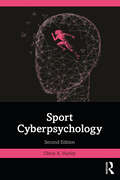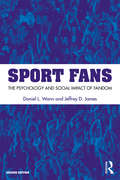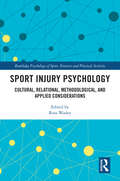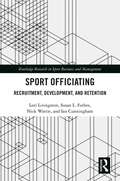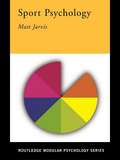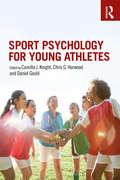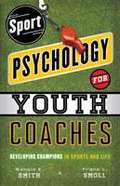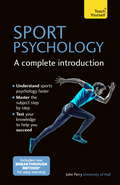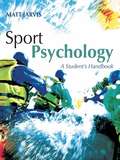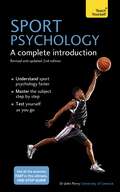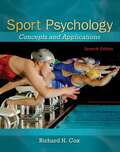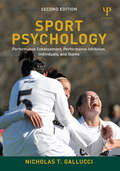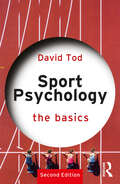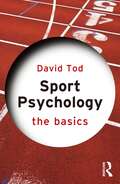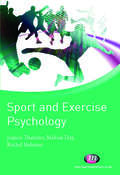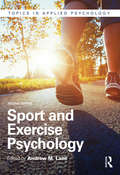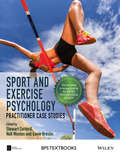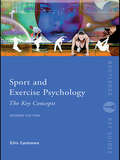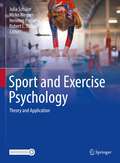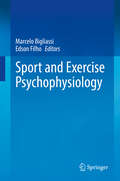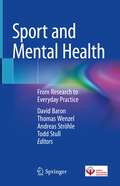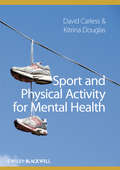- Table View
- List View
Sport Cyberpsychology
by Olivia A. HurleyThe new edition of Sport Cyberpsychology is the only textbook in this field that provides a detailed overview of theories, concepts and research findings specifically related to the discipline of sport cyberpsychology. Post-pandemic, this new edition explores the vast psychological impact technology has on athletes' thoughts, emotions and preparations for their sport, as well as the role technology plays in sport consulting, officiating and social interactions. It covers topics that include performance-enhancing technologies, social media use by athletes and sport personnel (e.g., sport officials) and the role of technology in sport psychology consulting. Problematic behaviours athletes may encounter or engage in within the online world, such as their experiences with cyberbullying and online gambling are also discussed.This second edition includes a review of the latest esports research and activities that are gaining global popularity. The final chapter presents some new research horizons in the field of sport cyberpsychology. The book includes a range of helpful features including case studies, open-ended discussion questions, suggestions for future research studies and extensive reference lists.Accessibly written, this edition of Sport Cyberpsychology offers a one-stop, engaging resource for students and instructors alike. It is important reading for students of sport psychology, cyberpsychology, sport coaching, sport officiating and sport technology, as well as coaches, traditional athletes, esports athletes, sport scientists and performers in areas such as dance, the arts, the military and medicine.
Sport Fans: The Psychology and Social Impact of Fandom
by Daniel L. Wann Jeffrey D. James<p>Sports, and the fans that follow them, are everywhere. Sport Fans: The Psychology and Social Impact of Fandom examines the affective, behavioral, and cognitive reactions of fans to better comprehend how sport impacts individual fans and society as a whole. Using up-to-date research and theory from multiple disciplines including psychology, sociology, marketing, history, and religious studies, this textbook provides a deeper understanding of topics such as: <p> <li>the pervasiveness of sport fandom in society <li>common demographic and personality characteristics of fans <li>how fandom can provide a sense of belonging, of uniqueness, and of meaning in life <li>the process of becoming a sport fan <li>sport fan consumption <li>and the future of sport and the fan experience.</li> <p> <p>The text also provides a detailed investigation of the darker side of sport fandom, including fan aggression, as well as a critical look at the positive value of fandom for individuals and society. <p>Sport Fans expertly combines a rigorous level of empirical research and theory in an engaging, accessible format, making this text the essential resource on sport fan behavior.</p>
Sport Injury Psychology: Cultural, Relational, Methodological, and Applied Considerations (Routledge Psychology of Sport, Exercise and Physical Activity)
by Ross WadeyWritten by a team of international experts and emerging talents from around the world, Sport Injury Psychology: Cultural, Relational, Methodological, and Applied Considerations challenges the status quo of the field of sport injury psychology and opens new and exciting future research trajectories by critically considering: How to evolve from an individual focused and single, scientific discipline into a cultural and relational focused and interdisciplinary discourse How to shift from the dominant positivist foundation towards a more inclusive scholarship with divergent epistemologies, theories, and methodologies How to replace the attempt to establish ‘best practice’ and desire for ‘clean’ findings with the need for continuous innovation and multifaceted applied experiences Each chapter stimulates debate and encourages theoretical, methodological, and/or applied diversification, and closes with future research directions that provide novel and rigorous programs of research that have the potential to advance the field of sport injury psychology into an interdisciplinary discourse that strives for and embraces collaboration between academic disciplines and with practitioners working in the field. Cutting edge, timely, and comprehensive, Sport Injury Psychology: Cultural, Relational, Methodological, and Applied Considerations is essential reading for undergraduate students, postgraduate students, and more established scholars in the fields of sport communication, sports medicine, sport psychology, sports sociology, and other related sport science disciplines.
Sport Officiating: Recruitment, Development, and Retention (Routledge Research in Sport Business and Management)
by Nick Wattie Ian Cunningham Lori Livingston Susan L. ForbesSport officials are tasked with maintaining order and adjudicating sport contests. Given their multifaceted role in enforcing rules, standardizing competitions, and keeping sport safe for all participants, they are a requisite part of the sport workforce. With ongoing reports of annual attrition rates in officiating in excess of 20-35% for various sports around the world, there is more than ample evidence that officiating dropout is a persistent, pervasive, and global challenge underpinned by multiple contributing factors including, but not limited to, the threat of verbal and physical abuse. Moreover, despite worldwide recognition and growing interest in the problem, there has not been a comprehensive resource for sport scientists and practitioners studying or working to reverse the ongoing trend. Sport Officiating: Recruitment, Development, and Retention provides a ‘state of the science’ summary in the emerging area of inquiry limited to sport officiating recruitment, development, and retention, and, provides insight and evidence-based approaches to the development of successful officiating development programs (ODP). This book is a primary reference work using a multifaceted, holistic, and evidence-based approach to integrate key findings from the sport science literature to date in suggesting and providing real-world solutions to the practical issues faced by sport organizers. Sport Officiating: Recruitment, Development, and Retention is a key resource for researchers interested in the development of sport officials and for sport practitioners aiming to implement officiating development programs (ODP) at any level within sport systems.
Sport Psychology (Routledge Modular Psychology)
by Matt JarvisSport Psychology is an introductory account of the major psychological issues in sport today. Major theories and up-to-date research are covered in the areas of personality, attitudes to sport, aggression in sport, anxiety and stress, social influences, motivation, and skill acquisition. A wide variety of sporting examples are used, ranging from football to ballet.
Sport Psychology for Young Athletes
by Daniel Gould Camilla J. Knight Chris G. HarwoodUnderstanding and applying psychology within youth sport settings is key to maximising young athletes’ enjoyment, wellbeing, and sporting performance. Written by a team of leading international researcher-practitioners, this book is the first to offer an evidence-based introduction to the theory and practice of sport psychology for children and young athletes. It provides practical strategies and guidance for those working in or researching youth sport, demonstrating how to integrate sport psychology effectively in a variety of youth sport contexts. With real-life case studies that demonstrate psychological theory put into practice, it discusses a wide spectrum of issues faced by young athletes and recommends the best approaches to addressing them. Key topics covered include: the cognitive, social, and physical development of young athletes optimising fun, motivation, and self-confidence enhancing young athletes’ relationships with coaches, parents, and peers managing stress, injuries, and transitions effectively developing talent and long-term engagement in sport encouraging organisational culture change. The most up-to-date and authoritative guide to sport psychology for young people, this is essential reading for anyone working in youth sport.
Sport Psychology for Youth Coaches: Developing Champions in Sports and Life
by Ronald E. Smith; Frank L. SmollThe authors address a wide range of everyday concerns including motivation, stress reduction, psychological skills, relations with parents, legal responsibilities, and other areas of importance to both coaches and athletes. Using clear examples and real stories, they help coaches hone their own skills so they can bring out the best in their young competitors - in sports and in life.
Sport Psychology: A Complete Introduction
by John PerrySport Psychology: A Complete Introduction is designed to give you everything you need to succeed, all in one place. It covers the key areas that students are expected to be confident in, outlining the basics in clear, jargon-free English and providing added-value features like summaries of key experiments and even lists of questions you might be asked in your seminar or exam.The book uses a structure that mirrors the way sports psychology is taught on many university courses, and is split into theory and application. Chapters in the first part include coverage of essential personality traits, including mental toughness, confidence, motivation and character. The chapters on applied sports psychology cover topics such as assessment, working with groups, skills training, coping techniques and working with coaches and children. There is also substantial coverage of measurement questionnaires, skills and routes to practice.Sport Psychology employs the 'Breakthrough Method' to help you advance quickly at any subject, whether you're studying for an exam or just for your own interest. The Breakthrough Method is designed to overcome typical problems you'll face as learn new concepts and skills.- Problem: "I find it difficult to remember what I've read."; Solution: this book includes end-of-chapter summaries and questions to test your understanding.- Problem: "Lots of introductory books turn out to cover totally different topics than my course."; Solution: this book is written by a university lecturer who understands what students are expected to know.
Sport Psychology: A Student's Handbook
by Matt JarvisThis book offers a student-friendly introduction to the discipline of sport psychology. All the key psychological issues in sport are explored, and difficult questions are raised: are athletes born or made? Does playing sport affect personality? What effect do cultural beliefs have on personal sporting development? Matt Jarvis has substantially revised and expanded his original coverage of the subject from the highly successful first edition (Sport Psychology (1999) in the Routledge Modular Psychology series). Here he provides a succinct but comprehensive account of major theory and research in sport psychology, whilst maintaining the readable style and student-centred approach which made the previous book so successful. Key issues covered include: Personality and sport Attitudes to sport Aggression Social factors affecting performance Arousal and anxiety Motivation and skill acquisition. There is an emphasis not merely on learning about sport psychology, but also on developing critical and creative thinking. In addition, the book includes chapters on conducting research and writing essays in sport psychology, as well as reflective exercises throughout the text.
Sport Psychology: A complete introduction
by John PerryThink about your favourite sport. Now ask yourself how much of success in that sport is down to physical skills and how much is down to mental skills?We all know that physical skills are vital for performance and understand about training them. We know that psychology is important too, but what people actually do to understand and train in it is less well known. Sport Psychology: A complete introduction gives you the answers, explaining everything you need to know in one place.Structured in two parts, theory and application, part one defines the idea of personality and covers essential psychological traits, including mental toughness, confidence, motivation, stress and character. Part two covers topics such as assessment, skills training, coping techniques, building concentration and working with coaches and teams. You will also find substantial coverage of measurement questionnaires, skills and routes to practice. As well as learning about how the mind works and how that has an impact on sporting performance, you will discover what sport psychologists actually do to improve a performer's psychological skills and mindset. Sport psychology used to be simply about performance. Now, the role of the sport psychologist is more holistic and includes athlete wellbeing, working with coaches and support teams, and operating at a more organizational level.Whether you are a student, interested in sport and sport performance as a professional practice, or involved in sport at any level, Sport Psychology: A complete introduction is your go-to guide.
Sport Psychology: A complete introduction
by John PerryThink about your favourite sport. Now ask yourself how much of success in that sport is down to physical skills and how much is down to mental skills?We all know that physical skills are vital for performance and understand about training them. We know that psychology is important too, but what people actually do to understand and train in it is less well known. Sport Psychology: A complete introduction gives you the answers, explaining everything you need to know in one place.Structured in two parts, theory and application, part one defines the idea of personality and covers essential psychological traits, including mental toughness, confidence, motivation, stress and character. Part two covers topics such as assessment, skills training, coping techniques, building concentration and working with coaches and teams. You will also find substantial coverage of measurement questionnaires, skills and routes to practice. As well as learning about how the mind works and how that has an impact on sporting performance, you will discover what sport psychologists actually do to improve a performer's psychological skills and mindset. Sport psychology used to be simply about performance. Now, the role of the sport psychologist is more holistic and includes athlete wellbeing, working with coaches and support teams, and operating at a more organizational level.Whether you are a student, interested in sport and sport performance as a professional practice, or involved in sport at any level, Sport Psychology: A complete introduction is your go-to guide.
Sport Psychology: Concepts and Applications
by Richard H. CoxSport Psychology: Concepts and Applications shows how concepts supported by current scientific research can be used to address issues and situations encountered everyday by physical activity specialists, coaches, athletic trainers, and athletes. This introduction to sport and exercise psychology addresses practical issues, such as dealing with anxiety, arousal, and stress; developing coping, relaxation, motivation, and energizing strategies; understanding the effects of an audience on human performance; building team cohesion; and preventing burnout and other negative effects.
Sport Psychology: Performance Enhancement, Performance Inhibition, Individuals, and Teams
by Nicholas T. GallucciSport Psychology, 2nd Edition provides a synthesis of the major topics in sport psychology with an applied focus and an emphasis on achieving optimal performance. After exploring the history of sport psychology, human motivation, and the role of exercise, there are three main sections to the text: Performance Enhancement, Performance Inhibition, and Individuals and Teams. The first of these sections covers topics such as anxiety, routines, mental imagery, self-talk, enhancing concentration, relaxation, goals, and self-confidence. The section on Performance Inhibition includes chapters on choking under pressure, self-handicapping, procrastination, perfectionism, helplessness, substance abuse, and disruptive personality factors. While much of the information presented is universally applicable, individual differences based on gender, ethnicity, age, and motivation are emphasized in the concluding section on Individuals and Teams. Throughout, there are case studies of well-known athletes from a variety of sports to illustrate topics that are being explored.
Sport Psychology: Teach Yourself
by John PerrySport Psychology: A Complete Introduction is designed to give you everything you need to succeed, all in one place. It covers the key areas that students are expected to be confident in, outlining the basics in clear, jargon-free English and providing added-value features like summaries of key experiments and even lists of questions you might be asked in your seminar or exam.The book uses a structure that mirrors the way sports psychology is taught on many university courses, and is split into theory and application. Chapters in the first part include coverage of essential personality traits, including mental toughness, confidence, motivation and character. The chapters on applied sports psychology cover topics such as assessment, working with groups, skills training, coping techniques and working with coaches and children. There is also substantial coverage of measurement questionnaires, skills and routes to practice.Sport Psychology employs the 'Breakthrough Method' to help you advance quickly at any subject, whether you're studing for an exam or just for your own interst. The Breakthrough Method is designed to overcome typical problems you'll face as learn new concepts and skills.- Problem: "I find it difficult to remember what I've read."; Solution: this book includes end-of-chapter summaries and questions to test your understanding.- Problem: "Lots of introductory books turn out to cover totally different topics than my course."; Solution: this book is written by a university lecturer who understands what students are expected to know.
Sport Psychology: The Basics (The Basics)
by David TodSport Psychology: The Basics provides an accessible introduction to the fundamental ideas at the heart of Sport Psychology today. This new revised and updated second edition examines the links between sport participants’ behaviours, their personality, and their environment to identify the factors which affect performance. Exploring theory and practice, it uses case studies to illustrate how key areas of theory are applied within a sport psychologist’s practice, answering such questions as: • What is sport psychology and what do sport psychologists do? • What factors affect sporting performance? • How can sport psychologists help parents and sport organizations? • Which psychological characteristics are associated with achievement in sport? • How can sport psychologists help with athlete’s mental health? With a glossary of key terms, suggestions for further study, and ideas for improving performance, Sport Psychology: The Basics is an ideal introduction for students of sport and coaches who would like to know more about how sport psychologists address questions about human behaviour in sport.
Sport Psychology: The Basics (The Basics)
by David TodSport Psychology: The Basics provides an accessible introduction to the fundamental ideas at the heart of Sport Psychology today. It examines the links between sport participants’ behaviours, their personality and their environment to identify the factors which affect performance. Exploring theory and practice, it uses case studies to illustrate how key areas of theory are applied within a sport psychologist’s practice, answering such questions as: What is sport psychology and what do sport psychologists do? What factors affect sporting performance? Which psychological characteristics are associated with achievement in sport? How can performance be improved by using theory? With a glossary of key terms, suggestions for further study and ideas for improving performance, Sport Psychology: The Basics is an ideal introduction for students of sport and coaches who would like to know more about how sport psychologists address questions about human behaviour in sport.
Sport and Exercise Psychology (Active Learning in Sport Series)
by Joanne Thatcher Melissa Day Rachel RahmanThis is a comprehensive and accessible text on exercise and sport psychology for students on sport science/sport and exercise science degrees. It adopts an integrated, thematic approach and covers all the required theory, concepts and research, accompanied by case studies to illustrate the applied nature of the material being covered. The book is split into two major sections, covering exercise psychology and sport psychology, and each chapter supports students as they progress from clear introductory material to more advanced discussions.
Sport and Exercise Psychology (Topics in Applied Psychology)
by Andrew M LaneThe new edition of Sport and Exercise Psychology asks four fundamental questions that get to the heart of this flourishing discipline: What inner states influence what people think, feel, and behave? How can people manage or self-regulate their own inner states? How can sport and exercise psychology professionals help people manage their inner states? Is sport psychology just a placebo effect? Taking an applied perspective that bridges the gap between sport and exercise, the book answers these questions by covering the key topics in the field, including confidence, anxiety, self-regulation, stress and self-esteem. There are also chapters on the role of music in performance, imagery and exercise addiction. Each chapter is written by an expert in that field, and includes a range of features illustrating specific issues, either within the research literature or their practical application. This is a comprehensive and engaging overview of an evolving discipline, and will be essential reading to any student of sport and exercise psychology. It will also be of huge interest to athletes and coaches seeking an accessible understanding of the role of psychology in sport.
Sport and Exercise Psychology: Practitioner Case Studies
by Gavin Breslin Stewart Cotterill Neil WestonSport and Exercise Psychology focuses on the most current issues in the field, integrating research and practice to develop a coherent understanding of current knowledge, future research directions and applied implications within the field. This is the first book to include theory-based case studies for sport performance, exercise and skill acquisition in one publication International authors dissect their case studies to highlight best practice/interventions in similar situations The theoretical basis behind each intervention is clearly explained, along with practical examples of how to work as a sport and exercise psychologist Provides content that is directly applicable to those students wishing to enter the profession via various national accreditation schemes, in addition to providing chartered psychologists with a text that can directly inform their reflections of their own practise The book is supported by an online learning environment that includes 'talking heads' videos for each chapter, further resources, questions and links to relevant external materials.
Sport and Exercise Psychology: The Key Concepts (Routledge Key Guides)
by Ellis CashmoreNow including exercise psychology terms for the first time in its second edition, Sport and Exercise Psychology: The Key Concepts offers a highly accessible introduction to this fascinating subject, its central theories and state-of-the-art research. Over 300 alphabetically-ordered entries cover such diverse terms as: adherence aggression emotion exercise dependence home advantage kinesiphobia left-handedness motivation retirement self-confidence. Cross-referenced, with suggestions for further reading and a full index, this latest key guide contains invaluable advice on the psychology of sport and exercise. A comprehensive A-Z guide to a fast-moving field of inquiry, this book is an essential resource for scholars, coaches, trainers, journalists, competitors, exercisers; in fact anyone associated with sport and exercise.
Sport and Exercise Psychology: Theory and Application
by Henning Plessner Julia Schüler Mirko Wegner Robert C. EklundThis textbook covers topics in sport and exercise psychology for students of psychology and sport science, as well as for sport practitioners who want to understand topics in sport psychology in more detail and depth.The book is divided into two main parts: Theory and Application. The first part covers the theoretical facets of sport and exercise psychology, and the close link between theory and practice, divided into the sub-disciplines of psychology (cognition, motivation, emotion, personality and development, and social processes). The second part focuses on the applications of sport and exercise psychology in the context of performance and health.With contributions from scholars across the globe, the book offers an international and timely perspective on the key fundaments of sport psychology. Taken together, these chapters provide a challenging yet accessible overview of the larger field of sport and exercise psychology. This book is suitable for readers at different levels of competence, supported with didactic elements (learning objectives and learning control questions) to find the right learning level.
Sport and Exercise Psychophysiology
by Edson Filho Marcelo BigliassiThis book addresses a critical gap in the literature, serving as a foundational resource for a rapidly evolving field that lacks a comprehensive reference point. It offers an in-depth exploration of research methods in exercise psychophysiology, beginning with a historical perspective before delving into key psychophysiological techniques and advanced methodologies for processing and interpreting biological data collected during exercise. Beyond methodology, the book examines core topics such as exercise tolerance, motivation, emotion regulation, attentional control, and cognition—unpacking the intricate psychophysiological mechanisms driving these phenomena. Designed to equip researchers and practitioners alike, it provides the necessary tools to design rigorous experiments and effectively apply complex psychophysiological methods in movement-related contexts. This resource is essential for anyone seeking a deeper understanding of how mind and body interact in the realm of exercise.
Sport and Mental Health: From Research to Everyday Practice
by David Baron Thomas Wenzel Andreas Ströhle Todd StullThis user-friendly, comprehensive and highly relevant book allows readers to gain a better understanding of mental health issues in sport and exercise. The field of sports psychiatry continues to grow globally at a rapid pace. This, in part, can be explained by the changing culture of sport leading to an appreciation of the role of psychiatric symptoms and syndromes in the world of sport, but also the increasing spread of both highly performance oriented and grass-roots basic sports and the associated risks in large sections of the population. The long-standing stigma attached to mental health problems, such as depression, anxiety, ADHD, suicide, brain injuries, substance-abuse, is being challenged not only by high-profile athletes, but also in public health and general mental health services. The book utilizes an innovative case-based and structured didactical format to provide short summaries of recent research by leading experts in the respective fields, as well as up-to date prevention and clinical guidelines for all relevant disorders in a way that is easily accessible to the large and growing groups interested and active in sports. This work is relevant for all mental health professionals and can also be used by a wider readership including medical doctors, psychologists, athletes and coaches. A second volume covers the role of exercise as an effective treatment for a number of common psychiatric conditions, such as depression, anxiety, eating disorders and substance abuse.
Sport and Physical Activity for Mental Health
by Kitrina Douglas David CarlessWith approximately 1 in 6 adults likely to experience a significant mental health problem at any one time (Office for National Statistics), research into effective interventions has never been more important. During the past decade there has been an increasing interest in the role that sport and physical activity can play in the treatment of mental health problems, and in mental health promotion. The benefits resulting from physiological changes during exercise are well documented, including improvement in mood and control of anxiety and depression. Research also suggests that socio-cultural and psychological changes arising from engagement in sport and physical activity carry valuable mental health benefits. Sport and Physical Activity for Mental Health is an evidence-based practical guide for nurses, allied health professionals, social workers, physical activity leaders, and sport coaches. The authors provide comprehensive analysis of a broad range of client narratives, integrating theory and the latest research to explore the effectiveness of various interventions. The book offers readers detailed recommendations, suggestions, and ideas as to how sport and physical activity opportunities can be tailored to provide the greatest mental health benefits.
